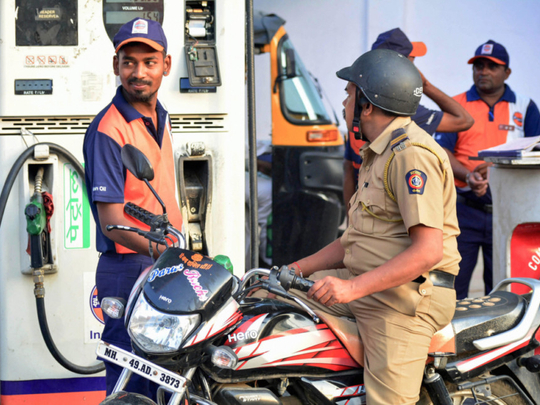
Our driver tops up the petrol when the indicator is at three notches before empty, unlike me who waits till it screams ‘reserve’, in red lights.
The driver’s name translates into English as ‘brave brother’ and like all people who brave the traffic here, he is fearless, but he is prejudiced against some petrol stations.
“Not that one,” he says firmly, when I point out to a petrol station ahead.
“Do they cheat? Don’t they fill the correct amount on the pump meter?” I ask helpfully.
“He believes this petrol station adulterates the petrol,” said my wife helpfully.
We three, the driver, my wife and I, travel the city speaking in diverse languages as if we were in a vehicle of the future where everyone speaks their own languages and it gets translated instantaneously by Google.
My wife and I speak in English as if we were a throwback to the British Raj, or as if we were people lost in time travel. My wife speaks to the driver in Tamil, thinking that it is much closer to Kannada (language spoken in Karnataka State).
I speak to the driver in Urdu or Hyderabadi (which curiously sounds like a person of Persian origin who has a tough mother and a soft-spoken father, speaking in a mixture of Arabic and Hindi).
In the confusion, the driver suddenly tries to speak to us in English, and we all happily roll along without understanding each other.
“How does he know it is adulterated,” I ask my wife.
“Chor,” answers the driver quietly and menacingly from the front, meaning, “crook”. “Chor is the Indian equivalent of the Arabic word, ‘harami’ and if you value your bone health, you do not use that word loosely in any Arab country or in the subcontinent.
Siphoning fuel
When we finish filling up, my wife asks the driver for the notebook from the glove compartment (have you seen anyone driving with gloves in India, BTW?) and she meticulously jots down the present meter reading, the number of litres we filled up, and the cost.
When I peeked inside the notebook, I just had to ask my wife: “How many miles have we done so far?”
“I am not sure,” she said.
“Has the petrol price gone up or is it cheaper?” I asked.
No answer. “What do you plan to do with all this data?” I asked.
“I am not sure. My mother always wrote it down and she said her driver was cheating her and siphoning off the petrol. She would say that one day she would show the figures to him and cut his salary,” said my wife.
“Do you know that since the past week or so, the price of petrol has been climbing up steadily?” I asked her, looking down at the notebook.
“Bandh, tomorrow,” said the driver, looking at me in the rear-view mirror, speaking in a mix of Hindi and English like a Bollywood star. ‘Bandh’ is lockdown.
“Hope it is a school holiday,” said my wife.
“Wonder if the beverage places will be open,” I said to myself. Bengaluru is known for its watering holes as the IT and expat crowd is a thirsty bunch.
“My friend in Dubai has sold his car. The maintenance was getting expensive,” I told my wife. “He said he did not wish to pay for parking.”
“Without a car it’s impossible to get around. Remember even in Ontario there were no train services to the smaller towns out of Toronto,” said my wife.
“Unlike us, millennials do not care about owning a car. They think it is a machine that is polluting the planet and that we just do not care,” I said.
“Will you drive an electric car?” I asked the driver.
“Haha,” laughed the driver. “Every day, power cut, sir,” he said.
Mahmood Saberi is a storyteller and blogger based in Bengaluru, India. Twitter: @mahmood_saberi









